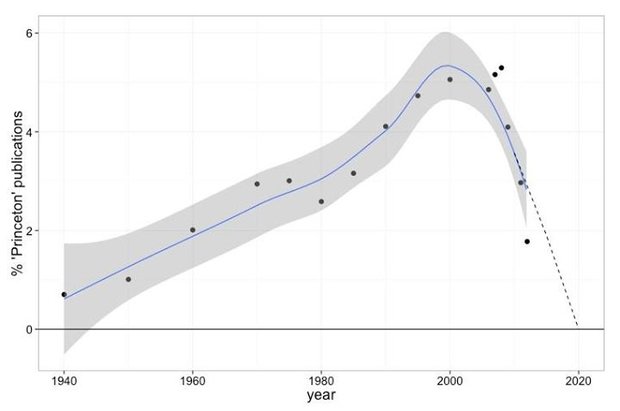No Facebook, you haven’t just debunked Princeton

A recent Princeton study estimated that 80 per cent of Facebook's users will leave the site by 2017, and as the research went viral, the social network just had to respond.
It's a shame, because while Facebook data scientist Mike Develin makes good points about the follies of extrapolation generally, he manages to miss the point in an epic way.
Princeton in decline?
Develin uses data from Google Scholar to show that articles citing Princeton are in decline.
But this trend is not quite as damning for Princeton as Develin suggests. Princeton can survive, and survive well, in a world where we have more places of higher learning.

The number of publications naming Princeton is more a reflection of the increasing number of colleges and universities around the world, not of Princeton's fall from prestige.
Develin makes similar comments about air with Google Trends data. His extrapolation showed that "by the year 2060 there will be no air left".
It's true that you can draw some very stupid conclusions from extrapolation (as well as some fun ones).
Social networks, however, are a very different ball game.
Network effects
Sites like Facebook need to have the critical mass of users – your friends and family – for you to want to use them.
If interest in Facebook wanes, especially in younger demographics, then what starts as a small decline in numbers has the potential to snowball.
Princeton doesn't need everyone to attend its college or to cite its research to be sustainable – but if you don't know enough people using a social network, there's no reason to log on.
Every user that joins the network expects to stay indefinitely, but ultimately loses interest as their peers begin to lose interest.
Thus a user that joins early on is expected to stay on the network longer than a user that joins later. Eventually, users begin to leave and recovery spreads infectiously as users begin to lose interest in the social network.
The authors call that first decline in users the "an abandonment phase" in their paper, and it's a possibility that Facebook need to take seriously.
Accordingly, when social networks die, they do it quickly. Princeton authors note how MySpace had 75.9m users in 2008, but decayed "to obscurity" by 2011.
Is Facebook doomed?
None of this is to say that the Princeton paper is right – but to compare their analysis for a social network to a college, or anything that isn't community-orientated, just makes no sense.
Facebook's survival is dependent on its user base, and on its continual replacement by younger members.
That's why investors got scared when the social network revealed that its demographic share of young US teens declined during the third quarter of 2013.